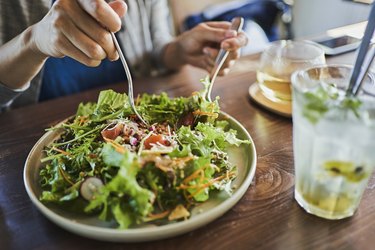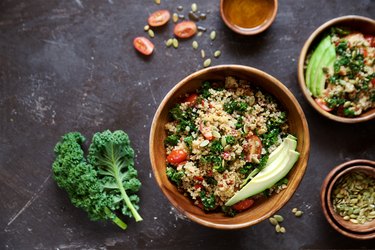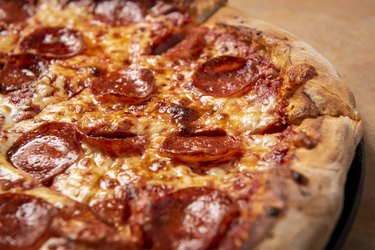
The Daniel Fast is based on the diet eaten by Daniel, an Old Testament prophet. Despite its name, there is no fasting during this short-term eating plan. Instead, many everyday foods are simply off-limits for 21 days.
People who follow this "fast" mimic Daniel's vegan-like eating strategy, which is detailed in a few verses in the Book of Daniel along with a description of his improved appearance after abstaining from meat and wine, per the King James Bible. There aren't a lot of modern-day studies to back up these biblical observations, but some research points to potential health benefits of this eating plan.
Video of the Day
Video of the Day
Many people who embark on the biblically inspired diet are motivated by faith, but you don't have to be religious to try it. Here's everything you need to know about starting the Daniel Fast, including what you can and cannot eat and the potential health benefits and drawbacks.
What Is the Daniel Fast?
Other popular fasting diets, such as intermittent fasting, restrict when you can eat. The Daniel Fast is different: For 21 days, you can eat when you want, and as much as you want — but the foods you can pick from are restricted.
Essentially, you'll prioritize eating whole grains, vegetables and fruits, while abstaining from meat, added sugar and a whole slew of commonplace foods, according to the Faith Temple Church of God in Christ, based in Albuquerque, New Mexico.
The inspiration for this diet comes from the Old Testament's Book of Daniel, Chapter 10, verses 2-3: "In those days I Daniel was mourning three full weeks. I ate no pleasant bread, neither came flesh nor wine in my mouth, neither did I anoint myself at all, till three whole weeks were fulfilled." (Daniel fasts earlier as well, for a shorter timespan.)
Today, people who follow the Daniel Fast interpret these verses by avoiding added sugars, alcohol, caffeine, meat, additives and preservatives for three weeks.
"I think this is an extreme diet," says Julie Miller Jones, PhD, LN, CNS, an emeritus professor of nutrition at St. Catherine University in St. Paul, Minnesota, and a member of the Grain Foods Foundation's Scientific Advisory Board. "I am never in favor of extreme diets, unless you have some sort of medical condition," she adds.
But there are some positive aspects to the Daniel Fast, Miller Jones says — for instance, it focuses on whole grains, vegetables, beans and legumes, which are all foods groups people typically don't eat enough of, she notes.
The Daniel Fast is not solely an eating plan. It's also a means to "draw closer to God," according to Elevation Church. For many, following the exact rules and guidelines is less central than the spiritual intent of the fast, per Elevation Church. Very often, the Daniel Fast is done with others — typically, a church group or congregation.
Is the Daniel Plan Different From the Daniel Fast?
The Daniel Plan, started by pastor Rick Warren with input from three doctors — Daniel Amen, Mark Hyman and Mehmet Oz — is a long-term lifestyle program that centers on faith, food, fitness, focus and friends, according to the Daniel Plan website. That's a big difference from the Daniel Fast, where eating habits shift for a short period of time.
The Daniel Plan divides your daily food into 50 percent non-starchy vegetables (think: broccoli, carrots, cucumber, peppers, tomatoes), 25 percent lean animal or vegetable protein and 25 percent starch or whole grains, according to the diet's website. Fruits are allowed as a side dish. Unlike the Daniel Fast, this plan allows meat, coffee, tea, butter and sweeteners such as honey, maple syrup and stevia extract.
While the Daniel Fast requires abstaining, the Daniel Plan is “about abundance, not deprivation,” per the website. It also has a strong spiritual component, with faith as the “foundation” of the program.
There are some real challenges to adopting the Daniel Fast eating plan, particularly for meat-eaters, caffeine-lovers and anyone with a sweet tooth. Many foods and beverages are prohibited, including animal, meat and dairy products; leavened bread; refined or processed foods; all types of sweeteners and alcohol, soda and caffeine, per the Faith Temple Church of God in Christ.
If you do the Daniel Fast, you can eat fresh, frozen or canned vegetables and fruits. Whole grains such as whole wheat, oats, quinoa, brown rice and amaranth are also on the Daniel Fast menu.
Warning
As with any diet, you should check with your doctor before starting this fast, especially if you have any medical conditions.
Foods to Eat on the Daniel Fast

During the 21-day Daniel Fast, you'll be on a plant-based diet that — as the Bible verses detail — does not allow for meat, caffeine or alcohol. Many followers also cut out refined and processed foods. But fruits, vegetables, grains, nuts, seeds and oil are permitted, according to a September 2010 study in Lipids in Health and Disease. And some people following the fast eat fish and seafood as a source of protein.
Take an in-depth look at the specific types of foods you can enjoy during the Daniel Fast, along with some of their key health benefits.
1. Fruits
All fruits are permitted during the 21-day Daniel Fast, according to Faith Temple Church of God in Christ.
Fruits are an important source of nutrition: They're low in calories but offer essential vitamins and nutrients, per the USDA. They're also a rich source of antioxidants, which protect your body from free radicals, per the Harvard T.H. Chan School of Public Health. During your fast, fruit's natural sugars may also provide a small energy boost.
Aim to get at least 2 cups of fruit each day, according to the Academy of Nutrition and Dietetics.
No fruit is better than another on this eating plan, but if slimming down is among your goals, choose more of these fruits that support weight loss:
- Apples
- Avocado
- Berries
- Citrus fruit (oranges, grapefruit)
- Mangoes
- Pineapple
- Watermelon
Tip
Because sweeteners are off-limits during the Daniel Fast, make sure any canned or frozen fruits do not contain added sugars.
2. Vegetables
Vegetables are a cornerstone of the Daniel Fast — you can eat any vegetable you like while following this short-term eating plan.
That's a win for your health: When they're part of a balanced diet, nutrient-rich veggies can lower your risk of stroke, heart disease and some types of cancer, according to the National Institutes of Health (NIH). Vegetables also contain fiber, which can help reduce cholesterol and improve digestive and gut health, according to the Mayo Clinic.
As with fruits, there is no off-limits veggie. But when it comes to vegetables for weight loss, choose more of these:
- Broccoli
- Brussels sprouts
- Cauliflower
- Green peas
- Leafy greens like spinach
- Spaghetti squash
Enjoy vegetables at every meal and for snacks while doing the Daniel Fast. Eat them raw or cooked — you can steam, roast or sauté most vegetables. Frozen, canned or fresh vegetables are all acceptable on this diet, per Faith Temple Church of God in Christ.
From a health standpoint, frozen vegetables may often be a better choice, Miller Jones says. The nutrient content can be higher for frozen produce processed in the field than fresh vegetables shipped across the country, she says.
If you opt for canned or frozen veggies, make sure to choose ones without preservatives, sauces or gravies, which will likely go against the guidelines of the Daniel Fast.
Tip
The Daniel Fast doesn’t distinguish between starchy vegetables (think: corn and potatoes) and non-starchy ones such as celery, cabbage, eggplant, mushrooms and broccoli. But if you’re following the Daniel Plan — not the Daniel Fast — vegetables are separated into starchy and non-starchy, per the website.
3. Whole Grains
Only whole grains (as opposed to refined grains) are permitted on the Daniel Fast, according to the 2010 study in Lipids in Health and Disease.
Whole grains are great sources of fiber, B and E vitamins, magnesium, copper and zinc, according to the Whole Grains Council, and they include:
- Barley
- Brown rice
- Oats
- Quinoa
- Rye
Increasing your whole grain intake can help lower the risk of type 2 diabetes, heart disease and colorectal, pancreatic and gastric cancers, according to a March 2017 review of meta-analyses in the Journal of Chiropractic Medicine. The researchers found these benefits to whole grains may come from eating two to three servings a day of them.
Refined grains, such as white flour, are not permitted on the Daniel Fast. That means no white bread, and desserts typically made with white flour, such as cookies and cakes, are off-limits.
Miller Jones notes that for the last three iterations, the USDA Dietary Guidelines for Americans have recommended making half (not all) your grains whole grains. Some nutrients are better absorbed by refined grains, she says. "This idea of this sort of purity, that 'if I only eat whole grains, I will be better' — the data doesn't bear that out."
4. Plant-Based Protein
You cannot eat meat or seafood on the 21-day Daniel Fast. But plant-based sources of protein are allowed, including:
- Beans
- High-protein grains (like quinoa and teff)
- Nuts and nut butters
- Seeds
While it is possible to get enough protein from plant sources, it can be tricky, so you may want to track your protein intake to ensure you're getting adequate amounts. An average, non-athlete adult should eat 0.8 grams of protein per kilogram of body weight, according to Harvard Health Publishing. A kilogram equals 2.2 pounds, so a 170-pound person, for example, should get about 62 grams of protein per day.
Most plant-based protein lacks one or more essential amino acids (those your body can't produce itself) to make it a complete protein, according to the Cleveland Clinic. Pairing incomplete proteins together — such as peanut butter and whole-wheat bread, or rice and beans — helps your body get all of the amino acids it needs.
Always check the nutrition labels to make sure your protein foods do not contain added sweeteners or artificial preservatives. For instance, nut butters often contain added sugar.
5. Fat Sources
Plant-based oils and fats are permitted on the Daniel Fast, according to the Faith Temple Church of God in Christ.
Olive, vegetable, corn and peanut oils are all included on the American Heart Association's list of healthy cooking oils. Nuts, seeds and their butters are also good sources of fat on the Daniel Fast.
6. Herbs and Spices
While on the Daniel Fast, you can add flavor to food with dried herbs and spices as well as salt and pepper. Or, try a squeeze of citrus juice to add acidity.
Soy products — such as soy sauce, which is made from soybeans — are also permitted, per Faith Temple Church of God in Christ.
7. Liquids
Staying hydrated is important while you're on the fast.
As a general guideline, aim to take in between 11.5 and 15.5 cups of fluids per day, according to the Mayo Clinic. Your exact needs will vary based on your body size, physical health and activity level, along with environmental factors (like how hot it is outside).
You don't need to drink all of that fluid, though. Many fruits and veggies have a high water content: A 200-calorie serving of grapefruit provides about 2 1/2 cups of water, per the USDA. Strawberries, cantaloupe, lettuce, squash, watermelon and celery are other good options to stay hydrated.
During the Daniel Fast, water is the preferred liquid. You can also drink 100-percent fruit juices or purees (just make sure they don't have any added sugars). And unsweetened almond milk, coconut milk, rice milk and soy milk are OK, according to Faith Temple Church of God in Christ.
Tip
If simple H2O gets too mundane, add fruit to your water; berries and cucumbers both stand up to being in water for many hours while offering a hint of flavoring.
Foods to Avoid on the Daniel Fast

As you can see, there are many foods you can eat during the Daniel Fast. But the list of verboten foods is long, too:
- Added sugars and sweeteners: All types of sweeteners, including honey, molasses and stevia, are on the banned list.
- Certain drinks: Alcohol, caffeinated beverages such as coffee, energy drinks, carbonated drinks and tea (including herbal tea) are all to be avoided.
- Meat and animal products: All animal, meat and dairy products are off-limits, including eggs.
- Additives or preservatives: This means many refined and processed foods can't be eaten during the Daniel Fast, including most breakfast cereals. Many plant-based meats may also fall into this category, including Beyond Meat products.
- Refined grains and baked goods: Baked goods such as pastries, along with white rice and all types of leavened bread (think: rolls, biscuits, pizza crust), are not allowed.
- Many fats: Solid fats, such as margarine and shortening, are off-limits. And deep-fried foods (potato chips, french fries and so on) are also forbidden.
Think of these guidelines as boundaries, rather than set-in-stone rules, and design the fast in your own way, suggests the Faith Temple Church of God in Christ. "If for any reason you eat something you shouldn't have during the fast, it is better to ask for forgiveness and continue than it is to stop the fast," according to the church.
Plant-Based Diet Health Benefits
There's not a set definition for "plant-based" — some people use it synonymously with a vegan diet, while others use it to refer to an eating plan that's primarily made up of plants, but also incorporates small amounts of animal products.
Regardless, plant-based diets — such as the Daniel Fast — are generally seen as beneficial for your health. According to the Cleveland Clinic, they can:
- Lower your risk of heart disease
- Help bring down high blood pressure
- Reduce the risk of diabetes
- Combat obesity
- Help protect against digestive diseases
- Lower LDL (or "bad") cholesterol
- Aid weight loss
Practicing the Daniel Fast doesn't result in any known negative health effects, according to Loma Linda University Health. In fact, Daniel Fast followers have often lost weight while reaching lower cholesterol and blood pressure numbers.
That's also the case for people who opt to follow the fast beyond the three weeks. Continuing the fast longer also leads to lower weight, blood pressure and cholesterol, per Loma Linda University Health.
Tip
Talk to your doctor or a registered dietitian about taking vitamin B12 supplements if you’re doing the Daniel Fast long-term, per Loma Linda University Health. Unless they’re fortified, plant foods do not contain this important vitamin, per the NIH. That makes it easy for people following a plant-based diet to fall short.
Health Benefits of a Vegetarian Diet
Because no meat is permitted, the Daniel Fast also closely resembles a vegetarian diet. The big difference: Lacto-ovo vegetarians eat dairy products, such as milk, yogurt and cheese, which are not permitted in the Daniel Fast. But because there are strong similarities between the two eating plans, it's worth considering the health benefits of a vegetarian diet.
In a December 2016 position paper, the Academy of Nutrition and Dietetics wrote, "appropriately planned vegetarian, including vegan, diets are healthful, nutritionally adequate and may provide health benefits for the prevention and treatment of certain diseases."
Research backs that up:
- Collectively speaking, vegetarians are less likely to have obesity compared to otherwise-similar non-vegetarians, according to the August 2016 edition of the Proceedings of the Nutrition Society.
- Vegetarians are also at a lower risk of diabetes, diverticular disease and eye cataract disorders, per the above research.
- When compared to omnivores, vegetarians have lower body mass index (BMI), total cholesterol and blood sugar, according to a June 2017 review in Critical Reviews in Food Science and Nutrition.
Health Benefits of the Daniel Fast
Overall, it's hard to know much about the benefits of the Daniel Fast without more comprehensive studies and research. But here's what we know so far:
1. It Could Lower Your Disease Risk
A small study, involving 43 participants, found that following the Daniel Fast "improves several risk factors for metabolic and cardiovascular disease," per the above-mentioned September 2010 research in Lipids in Health and Disease.
And, as noted above, following the Daniel Fast mimics the dietary choices of vegans and vegetarians, which may be associated with positive health outcomes. Long-term vegans and vegetarians have lower levels of obesity and decreased risk of heart disease, per an August 2016 study in Proceedings of the Nutrition Society.
2. It May Bring Down Inflammation
A similar small study, published July 2013 in Lipids in Health and Disease, tested the Daniel Fast on 29 people to assess its role in decreasing the risk of developing heart and metabolic diseases. The study found that all participants saw an improvement in lipids (aka fatty substances found in the bloodstream) as well as reduced inflammation.
3. It's Linked to Other Health Benefits
Other benefits may also occur when people take part in the Daniel Fast. One small December 2013 student research project in Senior Research Projects surveyed more than 100 students and faculty attending Southern Adventist University who followed the diet for 28 days (one week longer than usual) and determined these people "experience[d] spiritual progress, academic improvement [and] increased mental clarity."
A closer study was done within this overarching survey in which 30 students who identified as female were closely monitored, with their weight, resting metabolism, body composition and other details tracked both before and after their fast.
After the fast was complete, the study found that these people had experienced many positive changes, such as moderate weight loss, increased calorie burning at rest, increased fiber consumption and decreased cholesterol, according to the T. Colin Campbell Center for Nutrition Studies.
It's important to note, however, that this particular study was carried out by the religious educational institution Southern Adventist University. Given that the nature of the Daniel Fast is a religious one, there's a potential for bias due to the participants' religious beliefs.
Additionally, while the Daniel Fast may offer particular benefits, the majority of these benefits originate from it being a largely plant-based diet and not due to it being a fast. Therefore, a balanced plant-based diet may yield the exact same benefits as those mentioned above, without the restrictions that come with a fast.
For instance, a plant-based diet may also bolster mental wellness, according to a March 2018 study in the BMJ Journal of Open Diabetes Research and Care. Per the study, plant-based diets were associated with significant improvement in emotional wellbeing, physical wellbeing, cholesterol levels, depression, quality of life and general health.
4. It Takes a Group Approach to Weight Loss
Many diets (think: WW, formerly known as Weight Watchers) incorporate support, whether through online or in-person groups, along with sharing guidelines about what to eat, what not to eat and how much you can eat.
Group support is an important aspect of the Daniel Fast, too. Many church congregations band together to follow the eating plan as a group. Having support — in the form of groups or weight-loss classes — is very helpful for people seeking to lose weight, per the Mayo Clinic.
Miller Jones agrees, but notes that your personality and preferences plays a role in a group setting's success: "Other people doing it together can be an incentive for some people. But if you're an introvert, that may not be a good strategy for you," she says.
Health Concerns With the Daniel Fast

Even with the health benefits that can come from the Daniel Fast, there are some drawbacks to keep in mind, too.
1. It May Not Help With Long-Term Weight Loss
The Daniel Diet is a type of detox diet, Miller Jones says. That's something she thinks is best avoided. These types of diets make it seem like the body is dirty and needs to be cleaned, she says. "And I just don't buy that."
There are many reasons to avoid detox diets and cleanses. For one, they're typically not an effective means of losing weight, per the National Center for Complementary and Integrative Health (NCCIH).
Most people will lose weight on a restrictive diet, then gain it back at an even higher level once the diet ends, Miller Jones points out. Restricted diets tend to lead to overdoing it once people let their guard down, she says. "So for most people, this severe restriction is not a useful strategy in weight control."
2. It Might Lower Your 'Good' Cholesterol
The 2010 Lipids in Health and Disease study found that participants had a decrease in their HDL cholesterol when following the traditional Daniel Fast. This is your so-called "good" cholesterol, which helps remove "bad" cholesterol from the body — lowering it isn't good for your health.
3. It Could Short You on Some Nutrients
Because the diet is so restrictive, you have to choose your foods very carefully in order to get all the nutrients you need. Two nutrients of particular concern are vitamin B12 and iron, which many of us get from animal-based foods.
Some plant-based foods are fortified with vitamin B12, but it's only found naturally in animal foods, and the research on this diet does not mention the acceptability of supplementation. A B12 deficiency can cause anemia, constipation, fatigue and weakness, according to the NIH.
4. It Overly Restricts Food Groups and Calories
With a balanced diet, you'll take in enough calories and nutrition to maintain your body's health. That means consuming many foods, from a variety of food groups, according to Houston Methodist.
The Daniel Fast restricts the amount of food groups you can eat and therefore is not as beneficial in the long-term as a continued balanced diet.
Plus, people unfamiliar with a vegan or vegetarian diet may struggle to get enough calories. Indeed, a June 2018 review in American Family Physician explored the benefits of a balanced diet as opposed to a diet focused on macronutrients and weight loss, finding that balanced diets yielded the best results in the prevention of chronic diseases.
Warning
Before you begin the Daniel Fast, speak with your doctor to make sure it's safe for you. If you are on the Daniel Fast and experience unpleasant symptoms, such as digestive issues, skin or hair problems, fatigue or anything else unusual, contact your health care team.
- Lipids in Health and Disease: "Effect of a 21 day Daniel Fast on Metabolic and Cardiovascular Disease Risk Factors in Men and Women"
- Journal of Diabetes Investigation: "Higher Intake of Fruits, Vegetables or Their Fiber Reduces the Risk of Type 2 Diabetes: a Meta‐analysis"
- Academy of Nutrition and Dietetics: "Fiber"
- King James Bible Online: "Daniel Chapter 1"
- Faith Temple Church of God in Christ: "Ultimate Daniel Fast"
- King James Bible Online: " Old Testament's Book of Daniel, Chapter 10, verses 2-3"
- The Daniel Plan: "FAQs"
- Daniel Plan: "THE DANIEL PLAN PLATE"
- USDA: "Fruits"
- Harvard T.H. Chan School of Public Health: "Antioxidants"
- Academy of Nutrition and Dietetics: "Eat Right"
- National Institutes of Health: "Plants: Partners in Health?"
- Mayo Clinic: "Dietary fiber: Essential for a healthy diet"
- The Daniel Plan: "Keys to Eating the Daniel Plan Way"
- Whole Grains Council: "Whole Grains 101"
- Journal of Chiropractic Medicine: "Health Benefits of Dietary Whole Grains: An Umbrella Review of Meta-analyses"
- USDA: "Dietary Guidelines for America 2020-2025"
- Harvard Health Publishing: "How much protein do you need every day?"
- Cleveland Clinic: "Do I Need to Worry About Eating ‘Complete’ Proteins?"
- American Heart Association: "Healthy Cooking Oils"
- Mayo Clinic: "Water: How much should you drink every day?"
- USDA: "152 Fruits Highest in Water"
- Mayo Clinic: "Support increases weight loss success"
- Cleveland Clinic: "What You Should Know About Plant-Based Diets"
- Loma Linda University Health: "A beginner’s guide to the Daniel Fast diet"
- NIH: "Vitamin B12"
- Academy of Nutrition and Dietetics: "Position of the Academy of Nutrition and Dietetics: Vegetarian Diets"
- Critical Reviews in Food Science and Nutrition: "Vegetarian, vegan diets and multiple health outcomes: A systematic review with meta-analysis of observational studies"
- Proceedings of the Nutrition Society: "The long-term health of vegetarians and vegans"
- National Center for Complementary and Integrative Health: "'Detoxes' and 'Cleanses': What You Need To Know"
- Lipids in Health and Disease: "Both a traditional and modified Daniel Fast improve the cardio-metabolic profile in men and women"
- Senior Research Projects: "Three Dimensional Nutrition: Exploring nourishment of spirit, mind, and body during a 28-day Daniel Fast at Southern Adventist University"
- T. Colin Campbell Center for Nutrition Studies: "The Daniel Fast: Applying Wholistic Nutrition"
- BMJ Journal of Open Diabetes Research and Care: "Effectiveness of plant-based diets in promoting well-being in the management of type 2 diabetes: a systematic review "
- Houston Methodist: "What Does Eating a 'Balanced Diet' Really Mean?"
- American Family Physician: "Diets for Health: Goals and Guidelines"

